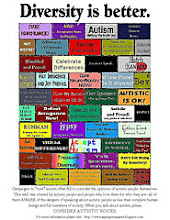OCD
Some of us will occasionally admit to a grain or two of OCD, but for some people, sometimes, it can be paralyzing.
On a lighter note, I noticed that parents such as myself, long for their non-verbal children to speak - when or if they eventually do, I still don't understand them.
***
I find wads of sticky tape balled up and stuck to the wooden jam of the pocket door - nasty lethal finger choppers.
I seek out the culprit.
"Why is their sticky tape all over the door dear?"
"S'not sticky tape. It's Scotch tape."
"Right. So why is there Scotch tape all over the door?"
"S'not all over the door, s'jus a small ball."
"Right...So...why is it there? Were you trying to lock the door?"
"Er...no."
"It's very important to tell the truth you know. The reason I don't allow locked doors is...because of...er...um...earthquakes, right?"
"Right."
"So why?"
"To stop my ears."
"Stop your ears from what?"
"From the door jam bang."
***
Although sometimes, I think he's teasing me.
"Mom!"
"Yes dear?"
"All the peoples in dis program are ....calm.....mediums."
"Are they? What is a calm medium?"
"Itsa...itsa...Ker...media."
"Um...try again?"
"I know...they're all Canadians!"
"Canadians? Are you sure?"
"Er...no... they're all...?"
"Yes?"
"Comedians!"

















